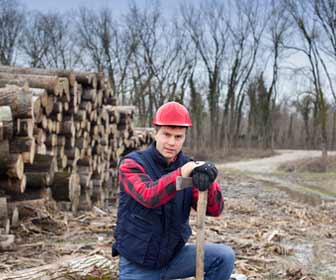Logging & Lumberjack Jobs
Can you see a tree right now? Maybe you can see an entire forest. Trees cover nearly 30% of the Earth. That’s almost 10 billion acres. Trees are majestic towering plants that supply us with numerous things and tons of jobs. The most dangerous job dealing with trees is a lumberjack.
Loggers, also known as lumberjacks, fell, cut, and transport trees for processing. Cutting down trees may not be the greenest job ever, but it’s one that is a necessity. Take a look around and see how many things are made from wood…Trees supply us with both paper products and lumber. Things like pencils, furniture, buildings, homes, papers, books, and desks all come from trees.
Loggers work deep in the wilderness in heavily forested areas like Oregon, Washington, Montana, British Columbia, or California. There they set up a base camp and get to work chopping down massive trees. It may seem like a simple job, but statistically it is one of the most dangerous.
Logging is a tough job, so loggers are typically strong, physically fit, incredibly lucky men with amazingly quick reflexes. They work in teams to flatten a patch of forest, collect the downed trees, and transport them away by truck, helicopter, or barge. Standard logger equipment includes chainsaws, hard hats, reflective vests, pikes, axes, and spiked shoes.
The first step of logging involves chopping down trees. Trees are often hundreds of years old, grow to hundreds of feet high, weigh several tons, and are worth several $1000s. A feller has the task of cutting down the tree using a chainsaw. This is accomplished by sawing a large wedge in the direction the tree should fall. Then a straight back cut is put in the opposite side. Ideally, a multi-ton tree will fall in the direction desired, but it doesn’t always. Fellers are at risk with every tree they fell.
Before a logger can climb the ranks to become a feller, he has to put in time as a chokerman. Chokermen are in more danger than fellers. Not only do they have to avoid falling trees, they also have to scramble across a field of huge logs to strap hooks and cables around downed trees to transport them. If a hook breaks, the steel cable can whip around and cut a man in half. After the trees are dragged out of the clear cut, they are usually loaded onto trucks using heavy machinery like cranes. Then they are driven to processing plants.
Logging is risky work and the insects are maddening. Not only do loggers worry about being cut in half, squished by a giant tree, or crushed by a falling widow maker; they also have to worry about where they are. Loggers work in the middle of the wilderness. Sometimes they are hours from the nearest hospital.
Logging leaves the Earth looking like a patchwork quilt. To limit the impact on the environment, the logging industry works with tree planters and communities to ensure future forests.
A logger’s reward is the adventure, the risk, and life in the outdoors. Logging is a physically demanding, never-ending job. There are no formal requirements to become a logger. Any large lumber company is in need of a hard working, determined, tough logger.
Logging salaries vary, but usually an entry-level logger makes about $25 per hour or around $30,000 per year. After years of luck, they can pull in $80,000 per year. Before you commit to a life of logging, tune in to Ax Men on the History Channel, watch American Loggers on the Discovery Channel, or grab tickets to the Lumberjack World Championships.
Loggers work long hours in the great outdoors to bring tree products to every home and community. It’s a dangerous job, but somebody must do it, why not you?
Quick Facts About Logging Jobs
Job Title: Logger, Lumberjack
Office: Forested wilderness
Description: Fell, cut, move, and transport trees for processing
Certifications/Education: No formal education required
Necessary Skills: Strong, Lucky, Love for outdoors
Potential Employers: Logging Companies
Pay: $25 per hour, between $30,000 and $80,000 per year
Helpful Lumberjack Employment Links:
Search Lumberjack Jobs on JobMonkey
American Loggers Council
Forest Resources Association
American Forest and Paper Association
Lumberjack World Championships


 Teach English in Asia
Teach English in Asia  Cruise Ship Jobs
Cruise Ship Jobs  Alaska Fishing Industry Jobs
Alaska Fishing Industry Jobs  Sharing Economy / Gig Economy
Sharing Economy / Gig Economy 